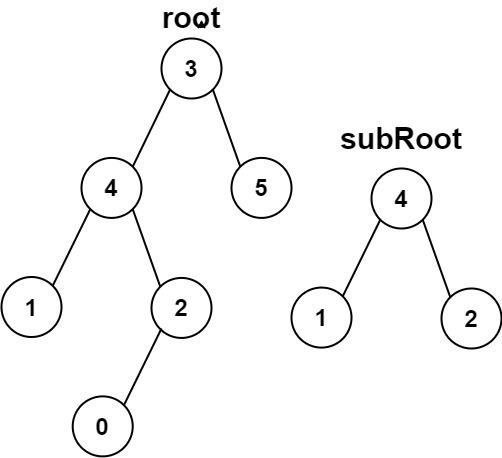https://leetcode.com/problems/subtree-of-another-tree/description/
Given the roots of two binary trees root and subRoot, return true if there is a subtree of root with the same structure and node values of subRoot and false otherwise.
A subtree of a binary tree tree is a tree that consists of a node in tree and all of this node's descendants. The tree tree could also be considered as a subtree of itself.
Example 1:

Input: root = [3,4,5,1,2], subRoot = [4,1,2]
Output: true
Example 2:

Input: root = [3,4,5,1,2,null,null,null,null,0], subRoot = [4,1,2]
Output: false
Constraints:
- The number of nodes in the root tree is in the range [1, 2000].
- The number of nodes in the subRoot tree is in the range [1, 1000].
- -104 <= root.val <= 104
- -104 <= subRoot.val <= 104
Daily code 이번엔 Tree구조로 Come back 해봤다.
욥욥..!
1. Python
겁나 어거지로 풀긴했다.
근데 좀 찝찝하긴 하다. BFS는 솔직히 머릿속에 빡 떠오르는데 아직 DFS는 잘 떠오르지 않는다.
그래서 BFS 점철로 풀었다 ㅎㅎ...
DFS , in/pre/post order도 거의 자동으로 머릿속에 구현될 정도로 좀 익숙해질 필요가 있다.
# 핵 어거지로 풀긴했다. 무한 BFS 돌리기
# Definition for a binary tree node.
# class TreeNode:
# def __init__(self, val=0, left=None, right=None):
# self.val = val
# self.left = left
# self.right = right
class Solution:
def isSubtree(self, root: Optional[TreeNode], subRoot: Optional[TreeNode]) -> bool:
# root 기준 traversal을 돌면서 subRoot을 찾는다.
# Traversal의 문제..
def bfs(node1,node2) -> bool :
q1 = deque([node1])
q2 = deque([node2])
while q1 or q2 :
if (not q1 and q2) or (not q2 and q1) : return False
temp1 = q1.popleft()
temp2 = q2.popleft()
if temp1.val != temp2.val : return False
if (temp1.left and not temp2.left) or (not temp1.left and temp2.left): return False
if (temp1.right and not temp2.right) or (not temp1.right and temp2.right): return False
if temp1.left : q1.append(temp1.left)
if temp2.left : q2.append(temp2.left)
if temp1.right : q1.append(temp1.right)
if temp2.right : q2.append(temp2.right)
return True
q = deque([root])
while q:
temp = q.popleft()
if temp.val == subRoot.val:
if bfs(temp,subRoot): return True
if temp.left : q.append(temp.left)
if temp.right : q.append(temp.right)
return False
누누히 느끼지만, 코딩은 기세다. 할 수 있다고 마음먹으면 어케든 된다..!
(단, 원래 풀 수 있는 난이도였다는 가정하에 ㅎㅎ)
가독성 정리한 깔끔한 코드는 아래와 같다.
# 가독성 개선
class Solution:
def same(self,x1: Optional[TreeNode],x2: Optional[TreeNode])->bool:
if not x1 and not x2:
return True
if not x1 or not x2:
return False
return x1.val == x2.val and self.same(x1.left,x2.left) and self.same(x1.right,x2.right)
def isSubtree(self, r: Optional[TreeNode], sr: Optional[TreeNode]) -> bool:
if r is None:
return False
if self.same(r,sr):
return True
return self.isSubtree(r.left,sr) or self.isSubtree(r.right,sr)
2. C
그리고 C로도 풀어보기! 특이하게 C Array로 Queue를 구현해보았다..!
# C with queue -> C 로 queue 구현하기 C queue C 큐
/**
* Definition for a binary tree node.
* struct TreeNode {
* int val;
* struct TreeNode *left;
* struct TreeNode *right;
* };
*/
bool helper(struct TreeNode* node1, struct TreeNode* node2){
if(!node1 && !node2) return true;
if((!node1 && node2)||(node1 && !node2)||(node1->val != node2->val)) return false;
return helper(node1->left,node2->left) && helper(node1->right,node2->right);
}
bool isSubtree(struct TreeNode* root, struct TreeNode* subRoot) {
int front = 0 , rear = 0;
struct TreeNode* queue[2001];
queue[rear++] = root;
while(front < rear){
struct TreeNode* temp = queue[front++];
if(helper(temp,subRoot)) return true;
if(temp->left) queue[rear++] = temp->left;
if(temp->right) queue[rear++] = temp->right;
}
return false;
}'Coding_Practice' 카테고리의 다른 글
| Smallest Positive Integer (0) | 2025.02.24 |
|---|---|
| Convert Sorted List to Binary Search Tree(Linked List,Divide and Conquer,Tree,Binary Search Tree,Binary Tree) (0) | 2025.02.17 |
| Combination Sum(Array,Backtracking) (0) | 2025.02.12 |
| Subsets(Array,Backtracking,Bit Manipulation) (0) | 2025.02.11 |
| Permutations(Array,Backtracking) (0) | 2025.02.10 |